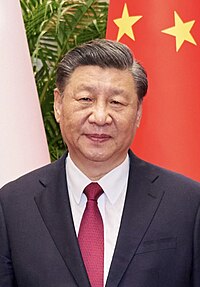
Photo from wikipedia
Bangladesh – but were probably designed elsewhere; and the car they recently bought perhaps made in Spain – although it probably wasn’t: the parts were made in a variety of… Click to show full abstract
Bangladesh – but were probably designed elsewhere; and the car they recently bought perhaps made in Spain – although it probably wasn’t: the parts were made in a variety of locations and just assembled in Spain. People in the UK may be more aware of this complexity as Brexit approaches, but that probably only applies to goods. Regarding services there is much less clarity – not least because the industry is not keen on it. The location of call centres may be apparent from the operators’ accents – either internationally or regionally – but when transactions are being made via the internet it is usually far from clear what is being done where. And that is just the transactions involving an end-user/purchaser; even more hidden are the many more transactions involving intermediaries, those with whom the end-users have no contact. In displaying this Peck’s book might be seen as somewhat disappointing: it is not abstract but much of its discussion, though empirically informed, is not replete with detailed exemplars. We know offshoring is big and complex, but we have no maps to show us how and where – because ‘they’ don’t really want us to know. (Nor, in many cases, do they want the state to know. The recent exposés of large multinationals avoiding national taxation régimes through their location decisions about the various elements of their complex organizations, let alone those of the many subcontractors they employ, illustrate the political issues involved.) Offshore brings that murky world into clearer focus, to the extent that is possible given the shadowy nature of much of its operation. In doing so, Peck not only sets out the nature of this rapidly changing world but also explores some fascinating side stories. One chapter, entitled ‘Outsourcing politics’, focuses on the political debates between US presidential candidates – notably Obama versus Romney – on the extent to which they favour offshoring (in Romney’s case, he promoted it during his business career and so ‘destroyed’ many American jobs) and would counter it if elected. It raises questions, only hinted at, regarding the degree to which offshoring can be restricted by, for example, Trump’s pre-election promises to repatriate American jobs, let alone what the consequences might be of the UK leaving the EU’s customs union and single market. The power of the state over outsourcing/offshoring capital is thus perhaps a next big issue facing contemporary capitalism. Governments speak about wanting global free trade (sometimes modifying that to fair trade) but at the same time seek to protect their own populations – and win their electoral support. The UK government, for example, argues that leaving the EU will enable it to promote even more trade globally where, presumably, comparative advantage will hold sway, yet then is criticised because it awards the contract for producing the country’s passports to an overseas (cheaper) supplier. The contemporary state faces a continued tension between facilitating capitalism’s operations wherever they might be and sustaining its national population’s economic well-being. Jamie Peck’s superb book focuses readers on that tension as they come to appreciate the complexity of the murky world in which we all now are deeply embedded.
Journal Title: Journal of Social Policy
Year Published: 2019
Link to full text (if available)
Share on Social Media: Sign Up to like & get
recommendations!